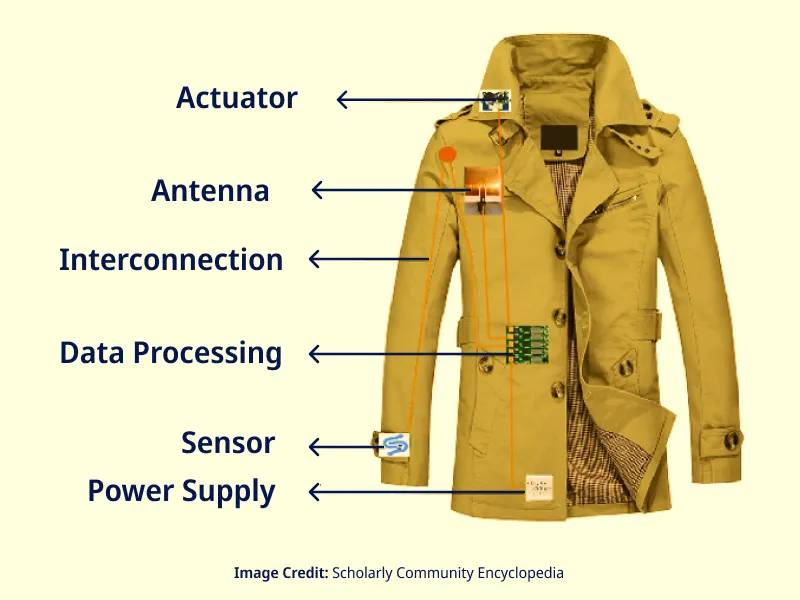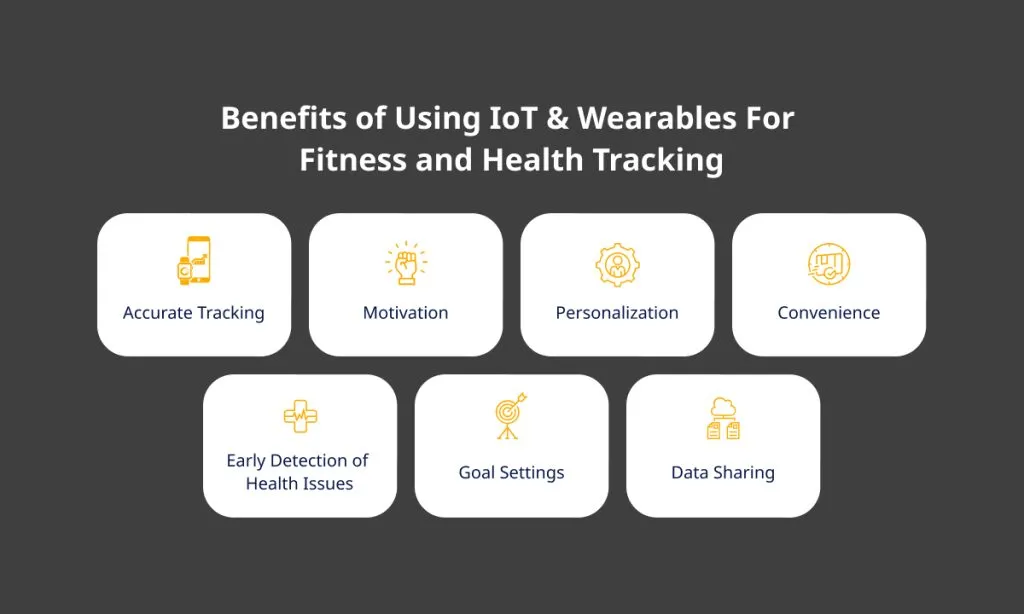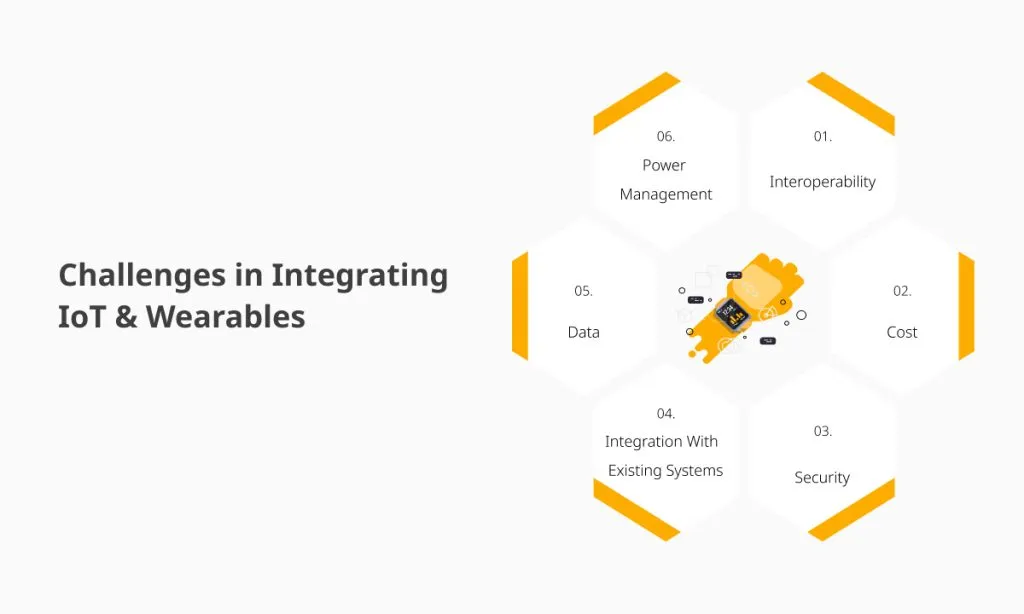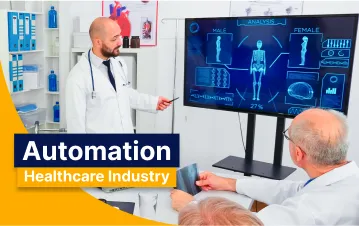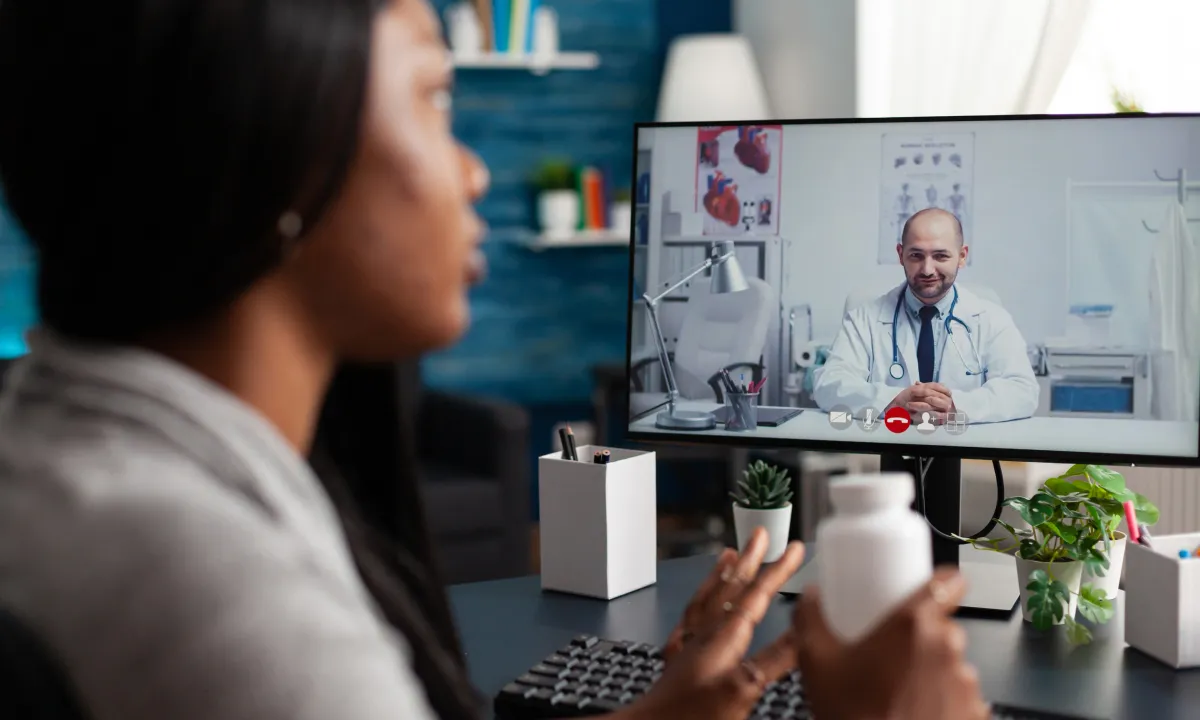With the rapid advancement of technology, smart devices and wearable technologies have taken an integral place in our daily lives. According to a report by Grand View Research, the global fitness app market is expected to grow at a compound annual growth rate (CAGR) of 17.6% from 2023 to 2030.
One of the key drivers behind this growth is the widespread adoption of smartphones worldwide. The fitness industry, like other sectors, has leveraged wearable technology and the Internet of Things (IoT) to provide real-time metrics and information on our health and fitness progress.
In this blog, we will explore how businesses can use wearable technology to enhance their ability to monitor customers’ health and fitness. Let’s dive in!
IoT & Wearables for Health & Fitness Tracking
The Internet of Things (IoT) and wearable technologies have enabled people to take charge of their health, reducing their dependency on doctors to monitor their vital signs and keep track of exercise goals.
A Statista report stated that the Internet of Things (IoT) market worldwide is expected to rise to more than $621 billion in 2030, tripling its revenue in ten years.
Types of Devices Used
Various IoT & wearable devices are designed to monitor & track physical activity, heart rate, sleep, and other vital signs.
These devices are often made small and lightweight and can be worn on wrists, waist, chest, or even in clothing.
Integrate IoT with wearables for advanced fitness monitoring.
Here are some popular types of health & fitness wearables integrated with IoT:
- Smartwatches: One of the most well-liked wearables on the market, smartwatches have features like heart rate monitoring, sleep tracking,, and fitness tracking. Some also have GPS built-in, enabling you to track your runs or bike rides without carrying your phone.
- Fitness Trackers: The purpose of fitness trackers is to record your daily physical activity, including your steps, distance traveled, and calories burned. Heart rate monitoring , sleep tracking, and even guided breathing exercises are features on some trackers.
- Smart Clothing: In the fitness sector, relatively new wearable technology is becoming increasingly popular. Your heart rate, body movements, and other vital signs are tracked by sensors built into these garments. It can be worn all day or while working out to keep track of your physical activity and general health.
- Smart Scales: Another type of IoT device that can be used for fitness & health tracking. These scales can measure your weight, body fat percentage, and other metrics to help track your progress toward your weight loss or fitness goals.
Also Read: IoT In Healthcare: Benefits, Challenges And Applications
Benefits of Using IoT & Wearables For Fitness & Health Tracking
Adopting wearables and IoT for fitness and health tracking has many extraordinary advantages, making it a powerful method of improving your health.
- Accurate Tracking: IoT wearables can offer precise and trustworthy data on your physical activity, heart rate, and other vital signs, thanks to their cutting-edge sensors and algorithms. Making wise decisions about your health can be made easier if you have a better understanding of your body.
- Motivation: You can stay motivated and on track to reach your fitness goals using IoT wearable devices to provide real-time feedback on your physical activity. Numerous devices have social features that let you share your accomplishments with loved ones, which can keep you accountable and motivated.
- Personalization: IoT wearables can provide personalized recommendations based on your activity level, heart rate, and other metrics. This can help you optimize your workouts and make more informed decisions about your health and fitness.
- Early Detection of Health Issues: Wearable IoT can help you detect potential health issues early on by tracking your vital signs and other metrics. This way, you can prevent minor issues from building into significant health problem.
- Convenience: These devices make tracking your physical activity and monitoring vitals easy throughout the day. Many devices are small and lightweight and can be worn comfortably throughout the day.
Connect wearables to IoT for enhanced health monitoring.
Integrating IoT with Wearables to Enhance Fitness & Health Tracking
Here are the step-by-step instructions on integrating IoT with wearables to track health and fitness metrics.
- Choose the Right Wearable: Select the proper IoT devices for your needs. Consider factors such as data accuracy, reliability, and ease of use. If you need expertise, consult with an IoT development company.
- Connect the Wearable to IoT: Choose suitable wearables based on the type of data you want to collect. Wearables come in various forms, including fitness trackers, smartwatches, and health monitors; thus, decide wisely so that you can hire dedicated software development teams accordingly when required.
- Develop a Data Collection Strategy: Develop a strategy for collecting data from IoT devices and wearables. Consider factors such as data privacy, data security, and data accuracy.
- Establish a Data Processing Framework: Develop a framework for processing and analyzing the data collected from IoT devices and wearables. This can include developing algorithms for analyzing the data and developing dashboards for visualizing the data.
- Establish Data Sharing Agreements: Data sharing agreements with the relevant stakeholders, such as healthcare providers or insurers, ensure the agreements comply with relevant privacy and security regulations.
- Develop Customized Solutions: Develop customized solutions based on the data collected from wearable IoT devices and wearables. This can include developing personalized fitness plans or providing recommendations for improving overall health.
- Monitor & Evaluate: Monitor and evaluate the effectiveness of the IoT and wearable solutions over time. Use the data collected to make improvements and adjustments to the solutions as needed.
Also read: IoT Vs AI
Common Challenges in Integrating IoT and Wearables 
Integrating IoT with wearables for better tracking of health & fitness can be challenging due to many reasons. The following are the common challenges faced by developers:
- Interoperability: It is one of the biggest challenges of integrating IoT with wearables. Various devices may use different communication protocols & data formats, making exchanging data seamlessly between devices difficult.
Solution: Using standardized protocols and data formats, such as MQTT or RESTful APIs, can enable device interoperability.
- Cost: Integrating IoT can be expensive, particularly if specialized hardware and software are needed. If a company lacks the right team, it may be required to hire machine learning experts.
Solution: Choose cost-effective solutions, such as commercially available hardware and software, after carefully weighing the costs and benefits.
- Security: IoT and wearables can be vulnerable to threats like data breaches and hacking.
Solution: Implement robust security measures, such as data encryption, secure communication protocols, and multi-factor authentication, to protect against security threats.
- Integration with Existing Systems: It can be difficult to integrate IoT and wearables with current systems, especially if the systems make use of various technologies or communication protocols.
Solution: Carefully evaluate the compatibility of the systems and choose compatible technologies and protocols, such as RESTful APIs or middleware, to enable seamless integration.
- Data Overload: IoT generates a ton of data, but managing and processing it can be overwhelming.
Solution: Implement data management strategies, such as data filtering, compression, and storage optimization, to efficiently manage and process data.
- Power Management: IoT and wearables are typically powered by batteries, which can be challenging to manage.
Solution: Use low-power hardware and software, implement efficient power management strategies, and optimize data transmission to minimize battery drain.
Also Read: Internet Of Things (IoT) Reshaping The Current & Future Market
Real-World Examples of IoT Wearables For Fitness & Health Tracking
There’s a huge demand for IoT in healthcare for the many advantages of the technology, especially from a well-being and patient monitoring perspective. Let’s look at some of the most common real-world examples of fitness IoT devices used for health tracking:
- Fitbit: One of the most well-known fitness trackers, Fitbit uses sensors to monitor various health indicators, including steps taken, distance traveled, calories burned, and other data. The device can be linked to a smartphone app to offer individualized coaching and insights.
- Moov: Moov is a wearable fitness tracker that offers individualized coaching for different workouts, such as running, swimming, and boxing. The Internet of Things (IoT) fitness device has sensors that monitor motion and deliver immediate feedback on form.
- Apple Watch: The Apple Watch is a smartwatch with a range of fitness and health tracking features, including heart rate monitoring, workout tracking, and activity rings that serve as visual cues for daily goals.
- MyFitnessPal: Users of the MyFitnessPal mobile app can monitor their dietary intake and exercise. The app integrates with numerous wearables and fitness trackers and has a database of over 11 million foods.
IoT devices and wearables are used in healthcare for remote patient monitoring, medication adherence, and chronic disease management.
Integrating IoT can transform how we track and manage our health and fitness and various other industries and applications. Businesses can hire IoT developers to keep up with the latest market trends.
IoT and wearables for comprehensive health monitoring.
Limitations of IoT Wearables in Fitness & Health Tracking
While IoT wearables have numerous benefits for fitness and health tracking, their use also has limitations. Here are some of the most common limitations:
- Battery Life: As IoT wearables require power to operate, the battery life of many devices can be limited.
- User Adoption: Wearable internet devices require users to wear and interact with the device, which may only be appealing or practical for some individuals.
- Data Security & Privacy: IoT wearables collect & transmit personal health data, which can be sensitive and private. This may lead to security and privacy concerns for the users.
- Data Accuracy: While IoT wearables have advanced sensors and algorithms, the data they collect may not always be accurate. For instance, motion sensors may not accurately track all movements, and heart rate sensors may not work correctly for all individuals.
- Cost: IoT wearables can be expensive, and not all users may be able or willing to invest in them. AI development companies are working on it and trying to make such devices accessible to all.
Thus, when looking to integrate IoT wearables for fitness and health tracking, it is essential to consider these devices’ limitations and hire IoT developers who have experience working with these technologies and can help navigate them.
Future of IoT and Wearables in Fitness and Health Tracking
There is a promising future of Iot and wearables in fitness & health tracking as people increasingly use sports IoT products.
A report by Allied Market Research stated that the global IoT in the healthcare market will reach $332 billion by 2027, with a compound annual growth rate of 25.1%.
Rising demand for cost-effective & efficient healthcare services, the increasing prevalence of chronic diseases, and the growing adoption of connected medical devices are three significant reasons why healthcare companies are turning to IoT and wearables.
ValueCoders has been empowering international brands by assisting them with AI development and helping them achieve their business objective. We provide cutting-edge AI solutions with a team of highly qualified and experienced individuals.
You can read here how our engineers assisted one of our clients in creating a nationwide IoE platform well-liked by businesses.
Summing Up
Integrating IoT and wearables offers many benefits for health tracking, including real-time data, personalized insights, and accountability.
This rising technology has already made its mark in the healthcare sector and has the potential to transform it further.
We expect continued growth and innovation as wearables become more advanced and IoT more prevalent in healthcare.
The Internet of Things (IoT) market worldwide is estimated to rise to more than $621 billion in 2030, tripling its revenue in ten years. Its future in health tracking is bright, and we can expect to see continued expansion and improvements in this field.
Medical practitioners can gain essential insights from the data provided by IoT devices and wearables, resulting in more individualized and successful therapies.


